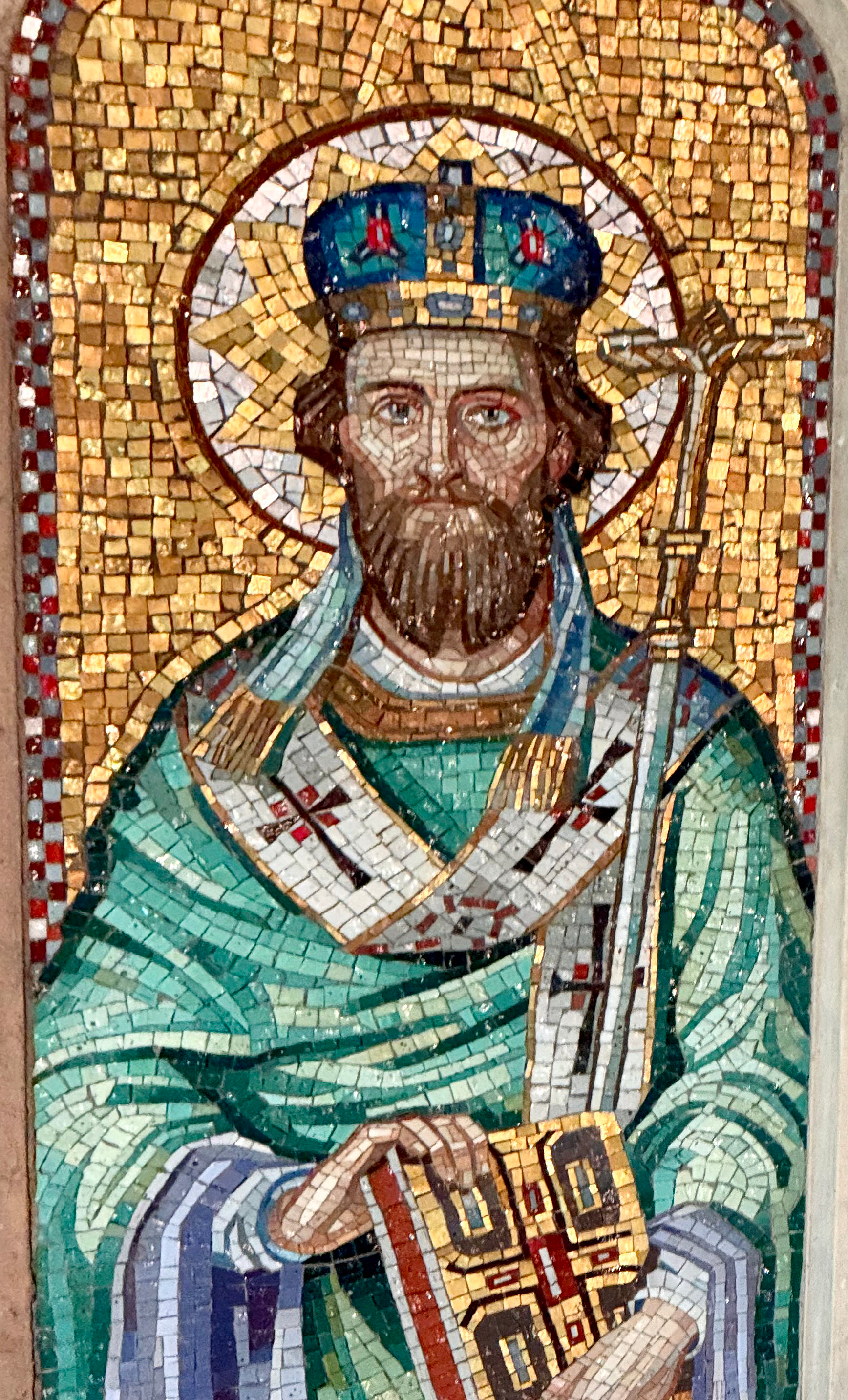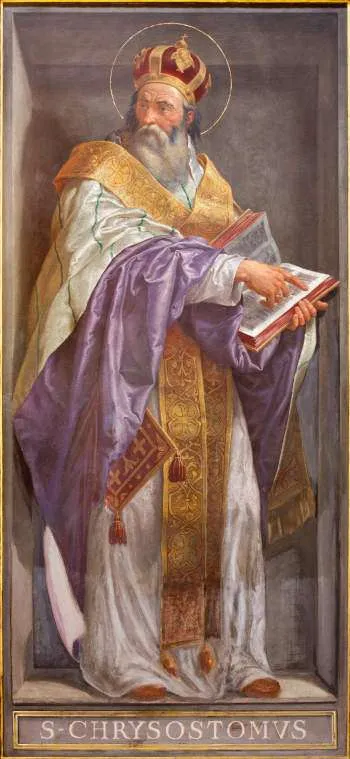Report on St. John of Antioch
Introduction
St. John of Antioch, often known as John Chrysostom (c. 349–407 AD), is one of the most revered Church Fathers in Eastern and Western Christianity. His title Chrysostom, meaning “Golden Mouth,” reflects his exceptional eloquence and skill as a preacher, as well as his theological and pastoral contributions. As the Archbishop of Constantinople, his influence extended throughout the Christian world, particularly in his efforts to reform the Church and society, his advocacy for the poor, and his writings on Scripture and Christian living. His life, works, and legacy have shaped Christian theology, liturgy, and pastoral practice for over 1,600 years.
Early Life and Education
John Chrysostom was born around 349 AD in Antioch (modern-day Antakya, Turkey), a major center of early Christianity and the Roman Empire. He was born into a Christian family, but his father, Secundus, died when he was young, leaving his mother, Anthusa, to raise him. Anthusa is often credited with instilling in him a deep commitment to the Christian faith.
John received a classical education in rhetoric and philosophy, which were vital skills for his later work as a preacher and theologian. His early studies were guided by the pagan philosopher Libanius, and later he studied Scripture under the tutelage of Diodore of Tarsus, a prominent Christian teacher. Despite his intellectual success, John felt a calling to a monastic life and withdrew to the desert around 375 AD, where he spent several years in asceticism and prayer, deepening his spiritual and theological insights.
Monastic Life and Return to Antioch
After several years of intense asceticism, John returned to Antioch around 380 AD, where he was ordained a deacon, and later a priest. His preaching during this time gained him a reputation for his clarity, fervor, and theological depth. John was known for his ability to explain Scripture in a way that was accessible to the common people while also offering profound insights into Christian life and spirituality.
In his sermons, he emphasized the importance of Christian morality, the need for repentance, and the dangers of worldly distractions. He was an outspoken critic of the luxury and excesses of both the wealthy and the clergy. His focus on humility, piety, and charitable works resonated with the ordinary people of Antioch, and his popularity as a preacher grew. John also emphasized the need for Christians to engage in social justice, particularly in caring for the poor and marginalized, which became a hallmark of his ministry.
Archbishop of Constantinople
In 397 AD, John was appointed Archbishop of Constantinople by Emperor Arcadius. His appointment to this influential position brought him into the heart of the Byzantine Empire, but it also exposed him to the political and ecclesiastical conflicts of the imperial court.
As Archbishop, John immediately set to work reforming the Church in Constantinople. He took strong stances against corruption within the clergy and secular leaders, denouncing the moral decay of society and urging Christians to live out the Gospel in their daily lives. His bold actions and uncompromising stance on moral and doctrinal issues earned him both admiration and enemies.
Preaching and Pastoral Work
St. John Chrysostom is most famous for his preaching, and his homilies remain a key part of his legacy. He was known for his impassioned, direct, and accessible sermons, which were both theological and practical. His sermons covered a wide range of topics, from biblical exegesis to social issues, and he is credited with refining Christian homiletic traditions.
One of his most significant theological contributions was his emphasis on the importance of Scripture. He encouraged the faithful to read and reflect on the Bible, helping to lay the groundwork for later Christian traditions of Biblical literacy. His sermons on the Pauline epistles, particularly those on the Letters to the Ephesians and Corinthians, continue to be a key source for theological study.
Chrysostom’s pastoral care extended to his efforts to reform the clergy and the faithful. He worked tirelessly to improve the moral and spiritual lives of his flock, seeking to elevate the standard of living for Christians by encouraging greater charity and humility. His famous Homilies on the Statues (c. 387–388 AD) addressed public unrest in Antioch and advocated for peace, unity, and moral reform in times of crisis.
Opposition and Exile
John’s uncompromising stance against corruption and his denunciation of the excesses of the imperial court and the wealthy elite made him many enemies. His outspoken critique of Empress Eudoxia, particularly in his denunciation of her opulence and pride, led to his first exile in 403 AD. Though he was reinstated temporarily, his conflict with the imperial family, combined with the rising opposition from certain Church factions, led to his final exile in 404 AD.
John was exiled to a remote region in Armenia, where he faced difficult conditions and suffered from harsh treatment. During this time, he continued to write and preach, remaining steadfast in his faith despite the adversities. He died in exile on September 14, 407 AD, shortly after being moved to the town of Comana in Pontus.
Writings and Theological Contributions
St. John Chrysostom’s writings encompass a wide range of theological, liturgical, and pastoral subjects. His commentaries on Scripture, sermons, and letters provide a rich source of insight into the early Christian understanding of theology, ethics, and Christian living.
1.Scriptural Exegesis: Chrysostom’s homilies on the New Testament, particularly his commentaries on the Gospels, Acts, and Paul’s epistles, are considered among the most important early Christian exegetical works. His approach to Scripture was both practical and theological, seeking to make biblical teachings applicable to daily Christian life.
2.Homiletics: Chrysostom’s eloquence as a preacher earned him the title Chrysostom, or “Golden Mouth.” His sermons are characterized by their clarity, passion, and simplicity, making complex theological ideas accessible to ordinary people. His homilies also emphasize the moral and social dimensions of the Christian faith, urging believers to live lives of charity, humility, and service to others.
3.Pastoral Writings: Chrysostom’s letters and pastoral writings reveal a deep concern for the spiritual health of the Church and its members. He addressed a wide range of topics, from personal spiritual development to practical issues of Church governance and discipline. His writings encouraged Christians to live out their faith through acts of charity, care for the poor, and moral integrity.
Legacy and Canonization
St. John Chrysostom is venerated as a saint by both the Eastern Orthodox Church and the Roman Catholic Church. His feast day is celebrated on September 13 in the Western liturgical calendar and on November 13 in the Eastern Orthodox Church. He is recognized as a Doctor of the Church, a title given to saints whose writings have had a significant impact on Christian doctrine and theology.
Chrysostom’s legacy is marked by his profound influence on Christian preaching, biblical interpretation, and pastoral care. His homilies and writings continue to be a central part of Christian study and are frequently cited by theologians, pastors, and scholars. His advocacy for social justice, care for the poor, and moral integrity remains relevant to Christian practice today.
Conclusion
St. John Chrysostom’s life and work exemplify the role of the Christian leader as both a preacher and a pastor, deeply committed to the spiritual and moral well-being of the people. His eloquent preaching, deep theological insights, and unwavering commitment to justice and the care of the poor have left an indelible mark on Christian tradition. His teachings continue to inspire and challenge Christians around the world to live out their faith with integrity, humility, and compassion.






